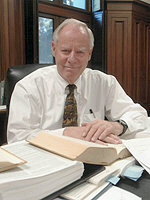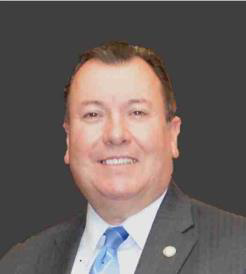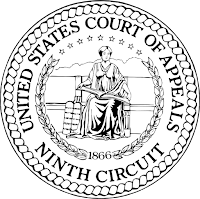From 4/3's PJ yesterday:
It
is with a very heavy heart that I share with you the news of the death of
Justice Richard D. Fybel (Ret.). Justice Fybel passed peacefully from
this world this morning at 2AM. after a courageous battle with an aggressive
form of cancer. He was surrounded by his family when he passed. Justice Fybel was a loving husband, a wonderful father, a caring grandfather, a
treasured friend, an extraordinary colleague, a generous mentor, and a
brilliant legal mind. He will be greatly missed by so many.
Richard
David Fybel was born in 1946 in Los Angeles, the oldest of the three sons of
Ernest and Ruth Fybel. He attended the University of California at Los
Angeles and received his bachelor’s degree in political science in 1968.
After graduation, Justice Fybel immediately matriculated at the University of
California at Los Angeles School of Law where he served on the Law Review and
was elected to the Order of the Coif. He graduated in 1971 and later he
served as the President of the UCLA Law Alumni Association.
Justice
Fybel began his legal career at Nossaman, Waters, Scott, Krueger & Riordan
in 1971. He was recruited to the San Francisco based firm Morrison
Foerster in 1981. The values of MoFo were consistent with Justice Fybel’s
own beliefs regarding meritocracy, service to community, and
nondiscrimination. During Justice Fybel’s four-year term as the office’s
managing partner, the office grew to 138 lawyers and took a decided turn toward
increasing representation among women and persons of color. Justice Fybel later
served as the firmwide managing partner for attorney personnel and on the
firm’s management committee. According to former MoFo firm chairman Carl
Leonard, despite Justice Fybel’s powerful and important position, one of his
greatest assets was his humility.
In
April 2000, Justice Fybel was appointed by Governor Gray Davis to the Orange
County Superior Court. In February 2002, his appointment as an Associate
Justice of the Court of Appeal, Fourth District, Division Three was confirmed
by the Commission on Judicial Appointments. During his twenty-year tenure
as a justice of the Court of Appeal, Justice Fybel made significant
contributions to the development of California law, the pursuit of justice, and
the advancement of judicial ethics. Justice Fybel authored some 260
published opinions. His opinions display a mastery of diverse areas of
law and are a valuable contribution to jurisprudence. Justice Fybel firmly
believed in the fair and evenhanded application of the law and the
responsibility of the court system to promote justice.
At
the time of his retirement, Fourth Appellate District, Division Three,
Presiding Justice Kathleen O’Leary stated, “I can honestly say as far as
colleagues go, Justice Fybel is the gold standard.” The Chief
Justice of California, Tani G. Cantil-Sakauye commented, “The arc, scope and
depth of Justice Richard Fybel’s extraordinary professional contributions to
justice in California for his 22 years as a jurist are breathtaking and will
guide us for years to come.” She went on to express her
deepest gratitude and admiration and described him as her “dear, brilliant,
kind, and gentle friend.”
A
noted expert on judicial ethics, Justice Fybel chaired the California Supreme
Court’s Advisory Committee on the Code of Judicial Ethics from 2004 until his
retirement in 2022. As chair, he successfully navigated the elimination
of the Code’s controversial exception to the prohibition against judicial
membership in discriminatory organizations. Based on his mastery of the
topic of judicial ethics, Justice Fybel was tapped to co-write the 4th edition
of the California Judicial Conduct Handbook, the 1000-page treatise on judicial
ethics used by virtually every judge in California. He also chaired the
advisory committee that made recommendations to the Supreme Court about the
creation of the Court’s Committee on Judicial Ethics Opinions.
Justice
Fybel wrote and spoke extensively on the German Legal System between 1933 and
1945 and the Nuremberg Trials. He was an Adjunct Professor at the Fowler
School of Law at Chapman University, where he co-taught a seminar with
Professor Michael Bazyler on The Holocaust, Genocide and the Law. Justice
Fybel was a member of the Holocaust Program Planning Committee for “How the
Courts Failed Germany,” cosponsored by the United States Holocaust Memorial
Museum, the University of California and the Judicial Council, and was a panel
member in the program at UCI.
Justice
Fybel was a member of the Boards of Advisors of the Fowler School of Law and
The Rodgers Center for Holocaust Education at Chapman University. He was
also a member of the Board of Visitors of the UCI School of Law, and of the
Jewish Law Institute Advisory Board of the Touro Law Center in New York.
He was a member of the JSerra Catholic High School Pre-Law Magnet Advisory
Board.
Justice
Fybel viewed his Jewish faith as a blessing and took to heart basic Jewish
values of justice, healing the world, charity, and kindness to
others. Justice Fybel was the President of the Board of
Directors of University Synagogue in Irvine from July 2010 through June 2012.
Justice
Fybel was a prolific author and frequent speaker on judicial ethics,
professionalism in the law, and other topics. He also was the recipient
of many, many awards. A few of those awards are the President’s Award
from the California Judges Association for selflessly providing time and
counsel to aid the CJA’s president in advancing the association’s goals, the
Franklin G. West Award presented by the Orange County Bar Association (OCBA) to
outstanding attorneys and judges whose lifetime achievements have advanced
justice and the law, and the 2005 UCLA Law School Alumnus of the Year for
Public and Community Service Award.
Justice
Fybel believed he led a charmed and blessed life, and he was grateful to all
the people who helped him be in a position to make contributions in the areas
he believed were important. As a person, an attorney, and a judge, he
showed empathy and understanding of the impact judicial decisions have on
litigants and lawyers, and he exemplified the virtues of honesty and
kindness. Justice Fybel’s theory of jurisprudence was this: Fair, just,
and correct results are obtained by impartially and rigorously applying the
relevant principles of law to the record in light of the relevant standard of review.
When
speaking at one of Justice Fybel’s many award ceremonies, Berkeley Law Dean
Erwin Chemerinsky remarked if you were to look up the word “mensch” in a
dictionary, you should see a photo of Justice Fybel. The following day, the
Southern California Appellate News blog posted a photograph
of Justice Fybel with the caption: “MENSCH Yiddish: מענטש mentsh: A
particularly good person, full of integrity and honor, with the noble qualities
one would hope for in a dear friend or trusted colleague; a gentleman. Someone
like Justice Fybel.”
Justice
Fybel is survived by his wife Susan, daughter Stephanie, son Dan (Garland
Testa), and four grandchildren who were the greatest joys of his life.
May his memory be a blessing.
K.O. Kathleen E. O’Leary



























